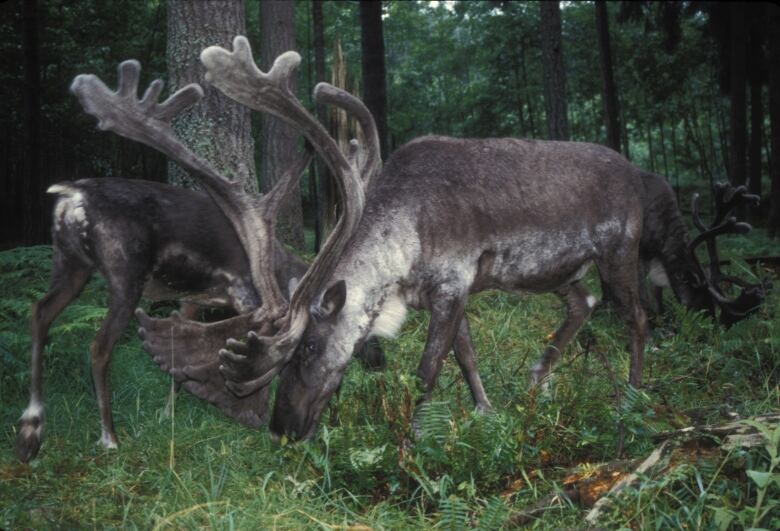How a B.C. caribou herd on verge of extinction is making a comeback
As woodland caribou continue to face extinction in B.C., a wild biologist and two First Nations have found success reviving a herd in the province's interior.
The decline over the last two decades of the Klinse-Za caribou herd has dropped from 191 to 16 animals when the recovery program started in 2013.
Now the Klinse-Za are up to 67 and counting, according to Scott McNay who led the project with the West Moberly and Saulteau First Nations.
"Habitat protection, restoration, the maternity pen, [and] removal of wolves on the ground" were among the long list of efforts that have been taken so far to achieve the revival, McNay told The Current's guest host Laura Lynch.
"First Nations have a trapping program as well, government has an aerial removal program," he continued. "Lots of different recovery actions all at once."
About three to four animals are born every year in the maternity pens. "So it's a slow process, but it's working," said McNay, who has worked on caribou conservation for 20 years.
McNay credited the West Moberly and Saulteau's involvement in the project. "That's their initiative and they're really throwing everything they can at the recovery effort," McNay said.
The project was initially funded by the local oil, gas and coal industries, McNay said.
"Believe it or not the industry came up and wanted to work with the First Nations to get a strong recovery program going," he said.
After launching the program and getting it off the ground, both the federal and provincial governments helped to fund the program.
'Nature takes its course'
McNay said the First Nations were initially hesitant about the use of a maternity pen, but the ultimately agreed that it was a necessary risk.
"First Nations had to grapple with the fact that it was very invasive and we came to grips with that and just threw everything at it."
The pen measures about seven hectares in size with geotextile hung over airline cable. It started with 10 animals — five from the Klinse-Za herd and five from the Scott West herd.
Supplemental food is provided twice a day and shepherds are on the lookout to ensure there's no risk of predators compromising the pen.
The caribou enter the pen in March and are set free at the end of July, "when the calves are a good size and able to outrun predators," McNay explained.
"After that nature takes its course. Those animals all go back to the wild."

Caribou have been declining in B.C. for many decades. According to a recent census, they're on the verge of disappearing completely south of the Canadian border.
Biologists flew over southern B.C. in early April to count the number of caribou and were stunned to find there are only three South Selkirk caribou left in the herd — all of them females.
"I think if we lose this herd then it's really the beginning of the end," McNay responded.
"It's an indicator that we're in hard times and we've got to address it."
Listen to the full conversation at the top of this page, which includes CBC reporter Bob Keating on the South Selkirk caribou herd, and Leo DeGroot, a wildlife biologist with the B.C. government.
This segment was produced by The Current's Geoff Turner and CBC reporter Bob Keating.